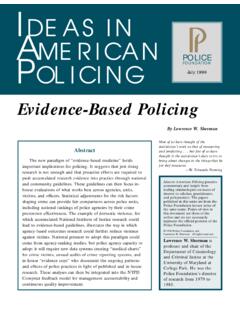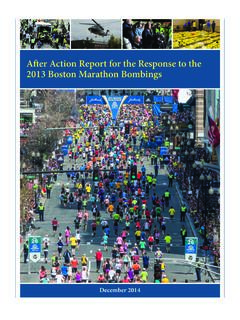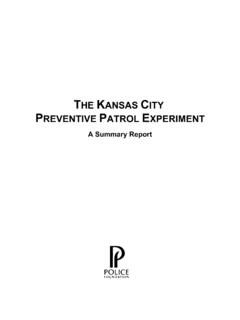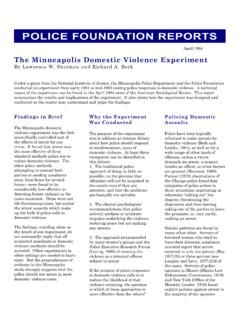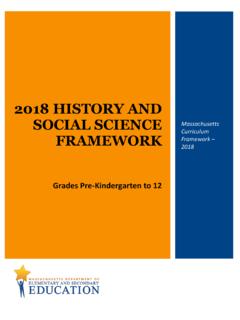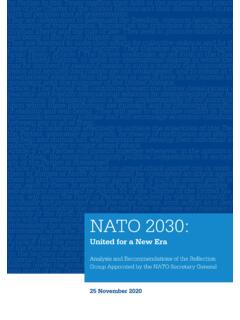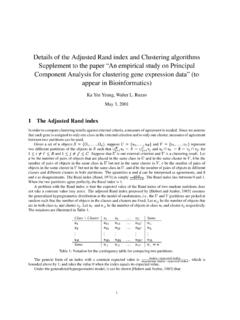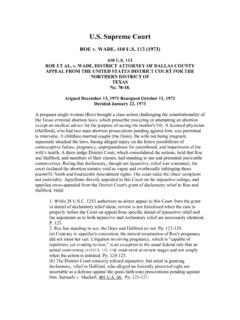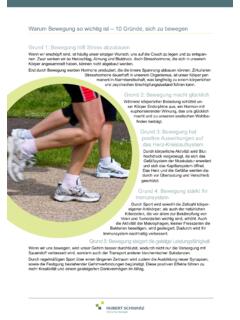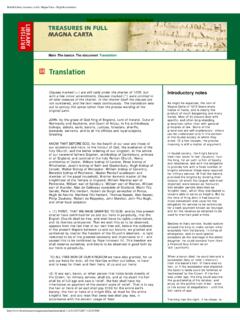Transcription of THE ABUSE OF POLICE AUTHORITY
1 THE ABUSE OF POLICE AUTHORITYA National Study of POLICE Officers Attitudes2 The ABUSE of POLICE AuthorityThis edition of The ABUSE of POLICE AUTHORITY : A National Study of POLICE Officers Attitudes has beenformatted for the Web in PDF format; the pagination differs from the printed restrictions FoundationTHE ABUSE OF POLICE AUTHORITYA National Study of POLICE Officers AttitudesDavid WeisburdRosann GreenspanEdwin E. HamiltonKellie A. BryantHubert Williams4 The ABUSE of POLICE AuthorityThe POLICE Foundation is a private, independent, nonprofit organization dedicated to supportinginnovation and improvement in policing. Established in 1970, the foundation has conducted semi-nal research in POLICE behavior, policy, and procedure, and works to transfer to local agencies thebest new information about practices for dealing effectively with a range of important policeoperational and administrative concerns.
2 Motivating all of the foundation s efforts is the goal ofefficient, humane policing that operates within the framework of democratic principles and thehighest ideals of the nation. The POLICE Foundation s research findings are published as an infor-mation research findings in this publication were supported by Grant Number 97 CK WX 0047,awarded on behalf of Community Oriented Policing Services, US Department of Justice. Findings,recommendations, and conclusions of the research reported here are those of the authors and donot necessarily reflect the official position or policies of the US Department of Justice. 2001 by the POLICE Foundation.
3 All rights, including translation into other languages, reservedunder the Universal Copyright Convention, the Berne Convention for the Protection of Literary andArtistic Works, and the International and Pan American Copyright Conventions. Permission toquote is readily 1 884614 17 5 Library of Congress Catalog Card Number: 2001 130311 POLICE Foundation1201 Connecticut Avenue, NWWashington, DC 20036-2636(202) 833 1460E-Mail: FoundationContentsForeword .. 9 Acknowledgments ..11 IIntroduction ..12 IIMethodology ..15 IIIC haracteristics of the Sample ..19 IVMain Survey Results ..23 ABUSE of AUTHORITY and the Use of Force 23 Code of Silence 25 Social Factors 29 Departmental Response 31 Controlling ABUSE 32 Community-Oriented Policing 35 Subgroup Analysis 39 Race 39 Rank: Supervisors and Nonsupervisors 42 Region 46 Agency Size 48 Gender 50 VConclusion.
4 52 Endnotes ..56 References .. 666 The ABUSE of POLICE Current Rank .. Level of Officers .. Background of Officers .. vs. Non-Hispanic Officers .. Attitudes Toward Limitations on Useof Force .. Perceptions of Use of Force Behaviorin Their Department .. of Silence: Attitudes .. of Silence: Perceptions of Behavior .. of an Unruly Suspect .. of the Effects of Extra-Legal Factorson POLICE Behavior .. Perceptions of the Public s AttitudeToward the POLICE .. of Media and Citizens ConcernsToward POLICE ABUSE .. Responses to ABUSE of AUTHORITY .. Role of Supervision in Controlling ABUSE .. Perceptions of the Effects of Trainingon ABUSE of AUTHORITY .
5 Community- POLICE Partnership .. of the Effects of Community Policingon ABUSE of AUTHORITY ..36By officers often treat whites better than they doAfrican Americans and other minorities .. officers are more likely to use physical forceagainst African Americans and other minorities thanagainst whites in similar situations..417 POLICE officers are more likely to use physical forceagainst poor people than against middle-class peoplein similar situations .. policing increases, decreases,or has no impact on the number of incidentsof excessive force .. policing increases, decreases,or has no impact on the seriousness of excessiveforce incidents.
6 Review boards are effective means for preventingpolice misconduct..43By Rank: Supervisors and first-line supervisors can help prevent policeofficers from abusing their AUTHORITY .. a POLICE chief takes a strong position against abusesof AUTHORITY , he or she can make a big difference inpreventing officers from abusing their AUTHORITY .. POLICE ABUSE of force could be stopped by developingmore effective methods of supervision.. blowing is not worth it.. code of silence is an essential part of the mutual trustnecessary to good policing.. is sometimes acceptable to use more force thanis legally allowable to control someone who physicallyassaults an officer.
7 Department rules about the use of force shouldnot be any stricter than required by law.. policing increases, decreases,or has no impact on the number of excessive force incidents.. policing increases, decreases,or has no impact on the seriousness of excessiveforce incidents..478 The ABUSE of POLICE AuthorityBy friendly contact with local residents and merchantsincreases the likelihood that POLICE officers will acceptfree lunches, discounts, or gifts of appreciation foreffective service.. is sometimes acceptable to use more force than islegally allowable to control someone who physically assaultsan officer.. officers always report serious criminal violationsinvolving ABUSE of AUTHORITY by fellow officers.
8 49By Agency a POLICE chief takes a strong position against abusesof AUTHORITY , he or she can make a big difference inpreventing officers from abusing their AUTHORITY .. first-line supervisors can help prevent officersfrom abusing their AUTHORITY .. POLICE ABUSE of force could be stopped by developingmore effective methods of supervision.. administrators concentrate on what POLICE officersdo wrong rather than what POLICE officers do right.. Gender .. Satisfaction With Career ..229 POLICE FoundationForewordWhen the POLICE fail to meet our expectations, we react with dismay, anger, andadditional demands. POLICE corruption and ABUSE of AUTHORITY have persistedsince the beginning of policing, and were exacerbated late in the twentieth cen-tury by America s drug epidemic.
9 Every year, incidents of POLICE ABUSE of author-ity cost local communities tens of millions of dollars in legal damages. Tax dollarsare wasted. Careers are destroyed. The public trust is every POLICE department has policies prescribing officer conduct andregulating use of force. No POLICE department or POLICE chief should knowinglycondone conduct that runs counter to either department policy or constitutionalstandards. While there is accountability for acts of corruption and other forms ofwrongdoing in most POLICE departments, there is little or no accountability forthose who tolerate such an environment. How, for example, were a few officersable to brutalize Abner Louima within sound if not sight of first-line supervisorsand other department officials in New York s 70th Precinct?
10 Even good people, placed in the wrong situation, will do the wrong thing. Badsupervision, intense peer pressure, and an organizational culture that sends un-clear signals can cause honorable men and women to behave in dishonorableways. The key moral problem for POLICE departments is the same as it is forcorporations, universities, labor unions, and government agencies: how can youcreate a culture that will induce members to strike the right balance betweenachieving an organizational goal and observing fundamental principles of de-cency and fairness?Values in POLICE agencies come not just from documents that describe them butalso from traditional POLICE culture.
